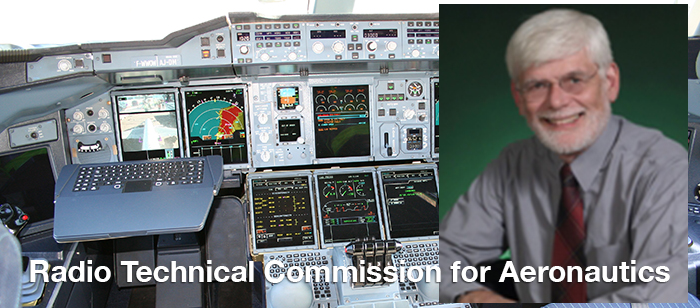
CSEE Professor Charles LaBerge, director of UMBC’s undergraduate Computer Engineering program, is being recognized at the 2015 Radio Technical Commission for Aeronautics Annual Symposium in Washington, D.C. on June 3 for significant work on aviation safety standards.
The Radio Technical Commission for Aeronautics (RTCA) is a not-for-profit association that collaborates with government agencies to achieve improvements in the safety and efficiency of the air transportation system.
Professor LaBerge was chosen to be honored by RTCA for his work on the “Minimum Operational Performance Standards for Avionics Supporting Next Generation Satellite Systems”. His research focuses on aeronautical navigation and communication applications, as well as digital signal processing, coding theory, and radio frequency interference.
Dr. Laberge's work was cited in a recent article in the RTCA digest, Spotlight on Volunteers: Communications Expert Advances Aviation Safety, for his leadership and contributions to standards for aviation communication. "Chuck has been invaluable to RTCA's work for many years – we could not have accomplished what we have without his expertise and the long hours he has spent advancing aviation safety," said RTCA President Margaret Jenny.
"Chuck LaBerge serves as Chair of RTCA’s SC-222, Inmarsat AMS(R)S, which has been working since October 2008 to produce several guidance documents focused on satellite systems capability. Chuck is known industry-wide for his expertise in radio signal processes and interference and brings a wealth of knowledge to the Committee's work. Chuck has a long and active history of contributing to RTCA products and first became involved with RTCA in the late 70s, helping to produce DO-177, a MOPS document focusing on Microwave Landing System (MLS) Airborne Receiving Equipment. He has made substantial contributions to 20 RTCA documents, not including document updates."
Dr. LaBerge describes the the work of the RTCA Special Committee 222 as defining the standards for satellite communication services that allow aircraft passengers to place telephone calls and access the Internet while in flight, especially in oceanic airspace. His previous RTCA work had focused on the special constraints that support pilot and controller communications related to the safety and regularity of flight along national and international air routes.
Professor LaBerge began working on RTCA standards at the Honeywell Aerospace Research & Technology Center, where he worked from from 1975 to 2008, achieving the position of Senior Fellow. While there, he completed a PhD in Electrical Engineering at UMBC in 2003. In 2008, he joined UMBC as Professor of the Practice, where he currently teaches undergraduate and graduate courses in computer engineering, helps teach the popular Introduction to Engineering class (ENES 101) and directs the undergraduate computer engineering program.